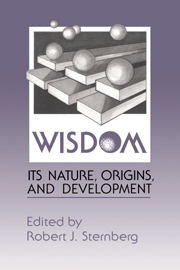Book contents
- Frontmatter
- Contents
- List of contributors
- Preface
- Part I Approaches to the study of wisdom
- Part II Approaches informed by philosophical conceptions of wisdom
- 2 Wisdom through the ages
- 3 The psychology of wisdom: an evolutionary interpretation
- 4 Wisdom as integrated thought: historical and developmental perspectives
- Part III Approaches informed by folk conceptions of wisdom
- Part IV Approaches informed by psychodevelopmental conceptions of wisdom
- Part V Integration of approaches and viewpoints
- Name index
- Subject index
4 - Wisdom as integrated thought: historical and developmental perspectives
Published online by Cambridge University Press: 05 June 2012
- Frontmatter
- Contents
- List of contributors
- Preface
- Part I Approaches to the study of wisdom
- Part II Approaches informed by philosophical conceptions of wisdom
- 2 Wisdom through the ages
- 3 The psychology of wisdom: an evolutionary interpretation
- 4 Wisdom as integrated thought: historical and developmental perspectives
- Part III Approaches informed by folk conceptions of wisdom
- Part IV Approaches informed by psychodevelopmental conceptions of wisdom
- Part V Integration of approaches and viewpoints
- Name index
- Subject index
Summary
The notion that wisdom may be the reward of advancing age has become a hoped-for antidote to views that have cast the process of aging in terms of intellectual deficit and regression. The result has been a flurry of recent writings attempting to define the nature of wisdom from philosophical or empirical perspectives (e.g., Clayton & Birren, 1980; Dittmann-Kohli & Baltes, in press; Holliday & Chandler, 1986; Meacham, 1983; Moody, Clayton, & McKee, 1983; Taranto, 1988). There is some emerging consensus that wisdom refers to a set of attributes assumed to be correlated with advanced age and not usually covered under the umbrella of “intelligence.” Moral and spiritual integrity, humility and compassion, or insight into the pragmatic, subjective, and psychological dimensions of life all have been associated with the concept of wisdom. It is not clear, however, just what is the underlying theme that holds together these various elements, nor what is their adaptive significance.
In this chapter, I propose that these recent attempts to revive an ancient topic, though important for discussions about the nature of the aging process, have implications of a much more far-reaching nature. They indicate, I suggest, the emergence of a new paradigm within which to discuss intellectual and cognitive functions and their development over the course of life. In Western intellectual tradition, these functions have been described primarily by reference to outer, objective, and logical forms of processing and contrasted with inner, subjective, and organismic ones.
- Type
- Chapter
- Information
- WisdomIts Nature, Origins, and Development, pp. 52 - 84Publisher: Cambridge University PressPrint publication year: 1990
- 119
- Cited by



